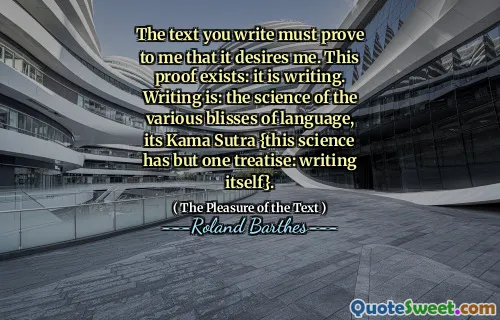In "The Pleasure of the Text," Roland Barthes explores the relationship between readers and texts, emphasizing the idea that reading is a form of pleasure. Barthes argues that texts can evoke joy and enjoyment through their structure and language, positioning the reader as an active participant in the creation of meaning. He distinguishes between two types of pleasure: the pleasure derived from textual engagement and the enjoyment of the author’s authority, which he suggests can limit the reader's experience.
Barthes also introduces the concept of the "writerly" text, which allows for multiple interpretations and engages readers in a more dynamic relationship with the material. He critiques traditional literary criticism for focusing too heavily on the author's intent and the fixed meanings of texts, advocating instead for an approach that celebrates the multiplicity of interpretations that readers can derive from them.
Ultimately, Barthes’ work encourages readers to embrace their role in creating meaning and highlights how the joy of reading arises from the interplay between text and reader. By shifting perspectives, he opens up new avenues for understanding literature, focusing on the pleasure that can be found in the act of reading itself rather than solely on what texts communicate.
More »
Today Birthdays
1729 -
Edmund Burke
1949 -
Haruki Murakami
1954 -
Howard Stern
1876 -
Jack London
1993 -
Zayn Malik
1951 -
Kirstie Alley
1863 -
Swami Vivekananda
1923 -
Alice Miller
1987 -
Naya Rivera
1825 -
Brooke Foss Westcott
1944 -
Joe Frazier
1951 -
Rush Limbaugh
1964 -
Jeff Bezos
1978 -
Jeremy Camp
1628 -
Charles Perrault
1856 -
John Singer Sargent
1970 -
Kaja Foglio
1953 -
Rick Santelli
1986 -
Gemma Arterton
1968 -
Raf Simons
1958 -
Christiane Amanpour
1966 -
Olivier Martinez
1996 -
Ella Henderson
1917 -
Maharishi Mahesh Yogi
1949 -
Ottmar Hitzfeld
1928 -
Ruth Brown
1968 -
Heather Mills
1946 -
George Duke
1968 -
Rachael Harris
1923 -
Ira Hayes
